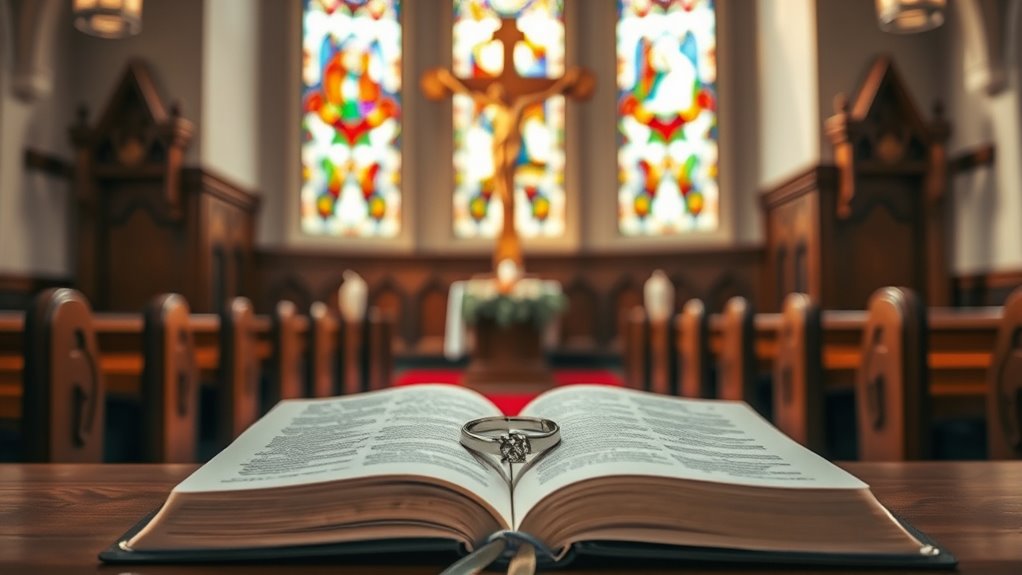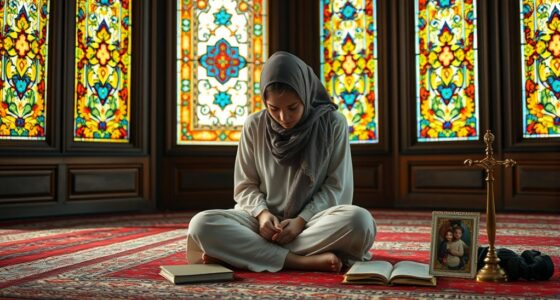Choosing a church wedding means embracing meaningful symbols like the ring and cross, which reinforce your faith and commitment. It offers a strong sense of community and tradition, creating a spiritual atmosphere that many find deeply fulfilling. However, strict protocols and rituals may feel limiting or less personal if your beliefs differ. If you’re curious about how these symbols and customs can fit into your special day, discover more about the pros and cons that can help you decide.
Key Takeaways
- Church weddings reinforce spiritual commitment through rituals like vows beneath a cross and ring blessings, adding meaning to the ceremony.
- Traditional customs foster community involvement and cultural or religious significance, strengthening bonds among family and friends.
- Strict protocols and schedules may limit personal customization and add stress, requiring careful planning and reflection.
- For non-religious couples, church rituals might feel inauthentic or obligatory, so assessing personal comfort with religious elements is essential.
- Overall, church weddings offer timeless symbolism and shared tradition but may pose logistical challenges and feel less personalized.

Are church weddings the right choice for your special day? If you’re considering a traditional ceremony, it’s important to think about how a church setting aligns with your vision. One of the key aspects of a church wedding is the deep-rooted marriage symbolism that comes with it. The church isn’t just a venue; it’s a sacred space filled with centuries of wedding traditions that can add a meaningful layer to your celebration. From the exchange of vows beneath a cross to the lighting of candles, these rituals are designed to symbolize the union’s spiritual significance. Many couples find comfort in these customs, viewing them as a way to honor shared faith and values. But while these traditions can enrich your wedding experience, they also come with certain considerations.
Church weddings embody timeless traditions and deep-rooted symbolism that can add meaningful significance to your special day.
For some, wedding traditions in a church setting serve as a comforting reminder of the commitment being made. These customs often include the blessing of rings, the giving of vows, and prayers that reinforce the sanctity of marriage. Participating in such rituals can strengthen your bond, making your wedding feel more profound and rooted in history. However, if you or your partner are not religious or don’t share the same faith, these traditions might feel more like obligations than meaningful acts. It’s worth reflecting on whether embracing these customs aligns with your personal beliefs or if they might feel forced or inauthentic.
Another advantage of choosing a church wedding is the sense of community it fosters. Many couples appreciate the chance to involve their family and friends in a traditional ceremony, creating a shared experience that’s rich in cultural or religious significance. This can be especially meaningful if your family has strong religious roots or values the church’s role in your lives. On the downside, planning a church wedding often requires adhering to strict protocols and schedules, which can limit flexibility. You might need to meet certain requirements, such as premarital counseling or specific dress codes, which could add stress or feel restrictive if you prefer a more relaxed, personalized approach.
In the end, deciding whether a church wedding is right for you depends on how much importance you place on marriage symbolism and wedding traditions. If you envision your wedding as a sacred, faith-centered event, a church ceremony can provide a timeless, meaningful backdrop. But if your priorities lean toward a more modern or unconventional celebration, the rigidity of some religious customs might feel limiting. Weighing these factors carefully will help you determine if a church wedding truly aligns with your vision for your special day.
Frequently Asked Questions
How Do Non-Christian Partners Feel About Church Wedding Traditions?
You might find that non-Christian partners often have mixed feelings about church wedding traditions. Some appreciate interfaith acceptance and see the ceremony as a meaningful cultural experience, while others feel uncomfortable with religious rituals that don’t align with their beliefs. It’s important to discuss these differences openly, respecting each other’s backgrounds. Finding common ground can help create a ceremony that honors both faiths and cultural differences, making the day special for both of you.
Can a Church Wedding Be Legally Recognized Outside the Ceremony?
Imagine sealing your commitment in a sacred space, but questioning if it’s recognized beyond those walls. Yes, a church wedding can be legally recognized outside the ceremony, provided you complete the necessary civil registration steps. This ensures your marriage’s validity in the eyes of the law, blending spiritual significance with legal acknowledgment. So, you can cherish your faith and secure your legal rights, all in one beautiful, meaningful union.
Are There Specific Dress Codes for Church Wedding Ceremonies?
You might wonder about the dress code for a church wedding. Most churches have attire expectations, encouraging guests to dress respectfully and modestly. While some churches specify formal or semi-formal attire, others are more flexible. It’s best to check with the venue beforehand to guarantee your outfit aligns with their standards. Dressing appropriately shows respect for the ceremony and helps create a reverent atmosphere.
What Are the Costs Involved in a Church Wedding?
When planning a church wedding, you should consider several costs. Expect to cover clergy fees, which vary by church, and reception expenses like catering and decorations. Additional costs might include altar fees, photography, and attire. It’s wise to inquire about all charges upfront and set a budget. By understanding these expenses, you can guarantee your wedding aligns with your financial plan and avoid surprises on your special day.
How Flexible Are Churches With Custom Wedding Rituals?
Churches vary in their ceremony flexibility, so you might find some open to ritual adaptations, while others stick to tradition. It’s best to discuss your ideas early with the clergy or wedding coordinator. They often appreciate couples wanting to personalize their wedding. Keep in mind, some churches may have strict guidelines, but many are willing to make small adjustments to create a ceremony that truly reflects your love and faith.
Conclusion
Choosing a church wedding blends tradition with meaning, offering spiritual significance that a civil ceremony might lack. Yet, it can also bring restrictions and added costs that you wouldn’t face elsewhere. While the sacred vows and community support create a heartfelt memory, the formalities may feel overwhelming or limiting. Ultimately, it’s about weighing the spiritual richness against the practicalities—finding a balance that makes your special day both meaningful and manageable.










